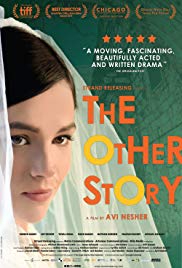
THE OTHER STORY
Israel, 2018, 112 minutes, Colour.
Joy Rieger, Maya Dagan, Sasson Gabai, Yuval Segal, Nathan Goshen, Abigail Harari.
Directed by Avi Nesher.
This is a very interesting film, for the Israeli audience, but for wider audiences outside Israel. It takes the audience into present Israeli communities, the Orthodox as well as the secular – and a visit to an organisation of women who are going back to pagan understandings to assert the role of women and a critique of the religious traditions and, of course, of men.
Director, Avi Nesher, also made the very interesting and arresting Past Life, contemporary stories as well as going back into German and Israeli history.
The central character is a young woman who has led a fairly free and easy life, her parents professionals, a glamorous mother, a psychologist father who has abandoned the family and gone into practice in the United States. She undergoes a conversion experience along with her boyfriend, a musician (and there are videos of their secular days for anyone to see). He still performs but with religious songs and music.
The young woman relates to her grandfather but, with her conversion, she has become alienated and refuses to speak to him. The couple are about to announce their engagement.
Her mother wants to stop the wedding, suspicious of the fiance and trying to find something against him. Her former husband arrives to see his father and has also been drawn into the situation. In the meantime, his own father has invited him to help with the mediation case, a father who wants custody of his son and his intent on educating him well, while the mother, previously feeling put down, has become part of the pagan cult.
There is a scene of the pagan rituals and the psychologist has asked his daughter to assist with the case and attend this ritual.
Which means that the film gives perspectives on quite a range of characters and stances in contemporary Israel, the prosperous secular, troubled ordinary people and their search for deeper meanings, and the studies and prayer at the seminary and the strong religious stances of the Orthodox.
The involvement of the daughter in the case as well as her discovery that her fiance is addicted to pain-relieving drugs means that she has to face a crisis of conscience and integrity.
1. An Israeli story? A contemporary story? Life in Israel and in Tel Aviv? Orthodox Jews, secular Jews, taking Jews? Interconnections?
2. The Israeli city, homes, the seminary for studies, the streets, tourists and tours, shops, celebrations, the visit to the convent and the artwork, the feel of the city? The musical score?
3. The title – and who is other? Each character being the other, with their own story contrasting with others?
4. The situation, the wedding, preparations, rituals of engagement? Anet and the relationship with Shachar, tI just realised I may not heir past, drugs and promiscuity? The reform? The tactics of her mother, to block the wedding? The disapproval of the groom?
5. Anet, in herself, age, her past life, her fiance, the experience for of conversion, devout religiosity? The plans? Her relationship with her mother, the mother dominating, the absent father and her resentment? Need for him? And not talking to her grandfather? Determined, her fiance still performing, but religiously? Her past and the presence of the videos? The background of Jewish Orthodoxy, study, the seminaries? The fiance, his back pain, his drug dependence, the addiction and is buying the drugs?
6. The grandfather, his age, psychologist, Sari and Rami and their case, his trying to mediate? His health and the risks? His son’s arrival, the revelation that he sent for him, for himself, rather than about the wedding? Involving his son in the case? His illness, going to hospital?
7. The mother, glamorous, determined, the resentment of her husband and his leaving? Her expressions of disdain, yet wanting him to be involved? To try to uncover any scandal about the groom? Her going to the celebration and her weeping, her daughter’s reaction? the communication, pretence?
8. The psychologist, coming to see his father, absence from his family, alienation of his wife, the resentment of his daughter? In the US, his success? The scam on the phone call from Diana? His father involving him in the case, meeting the couple, listening to the disputes? Involving his daughter in the case, the interviews, the issue of paganism, feminism, the visits, his experience of the boy? Getting his daughter to go to the cult meeting, the dangers? Rami taking his son, working out that he was at the convent, the sisters and their help, bring him back? Asserting to Sari that he had come with the boy for consultations?
9. Sari and Rami, the marriage, their son, his age, Rami and his tour guide work, knowledge, trying to improve his son? The implicit disdain of his wife’s knowledge? Her anger, wanting custody, becoming involved in the cult, the paganism, goddesses, and not believing it but taking the opportunity to assert herself? The scene with the cult rituals, the women, the children being present? Anet and her presence, bewilderment? Rami abducting his son, taking refuge in the convent with the sisters working on the art which he sold? The police, Anet and the moral dilemma of whether she should not lie on not? The confrontation with Sari? The mutual slapping?
10. The fiance, his addiction being exposed, his being upset, Anet and his telling of the truth? Her being upset, challenged? Her having to admit flaws and failures?
11. The other stories, the wedding, interventions, possible reconciliation and forgiveness?